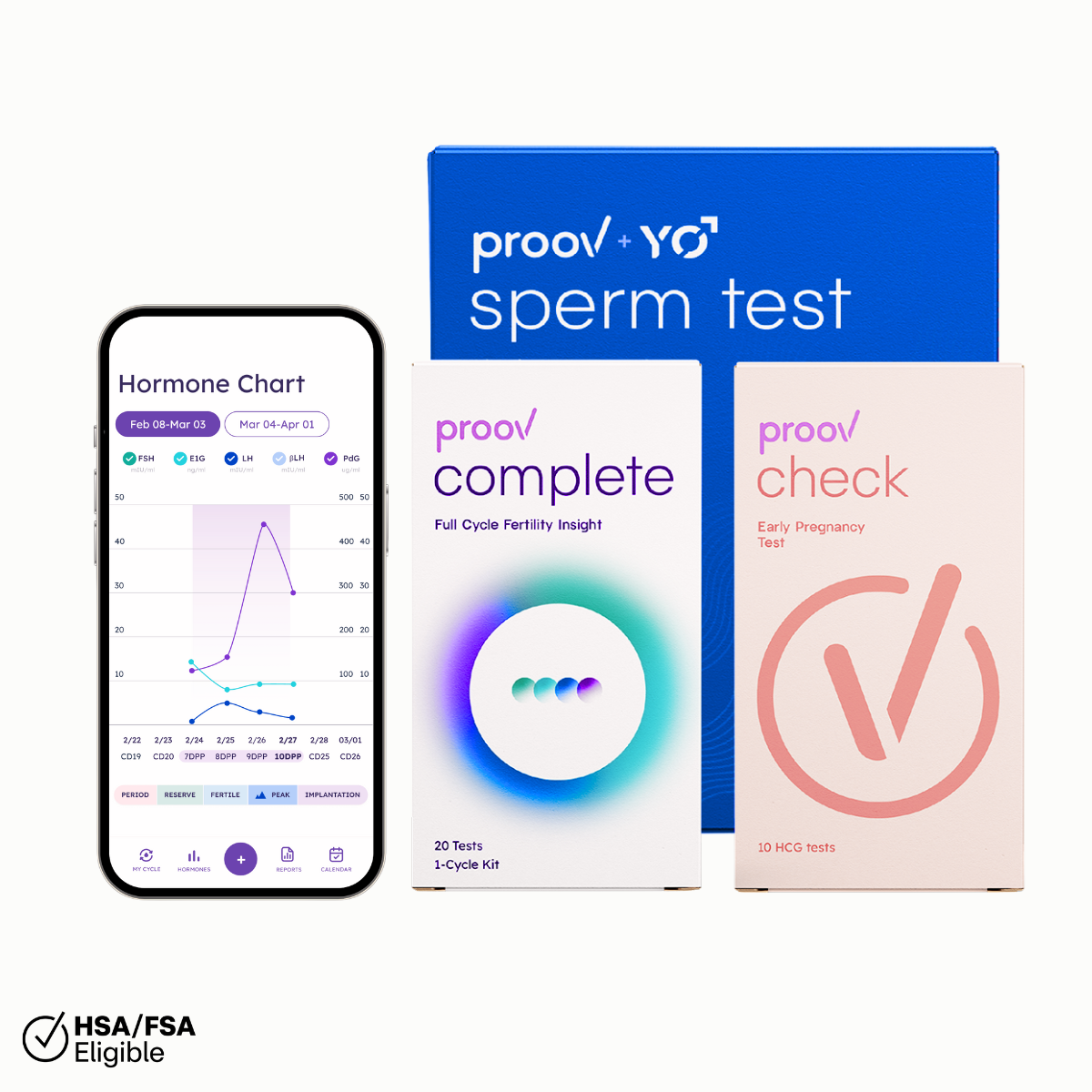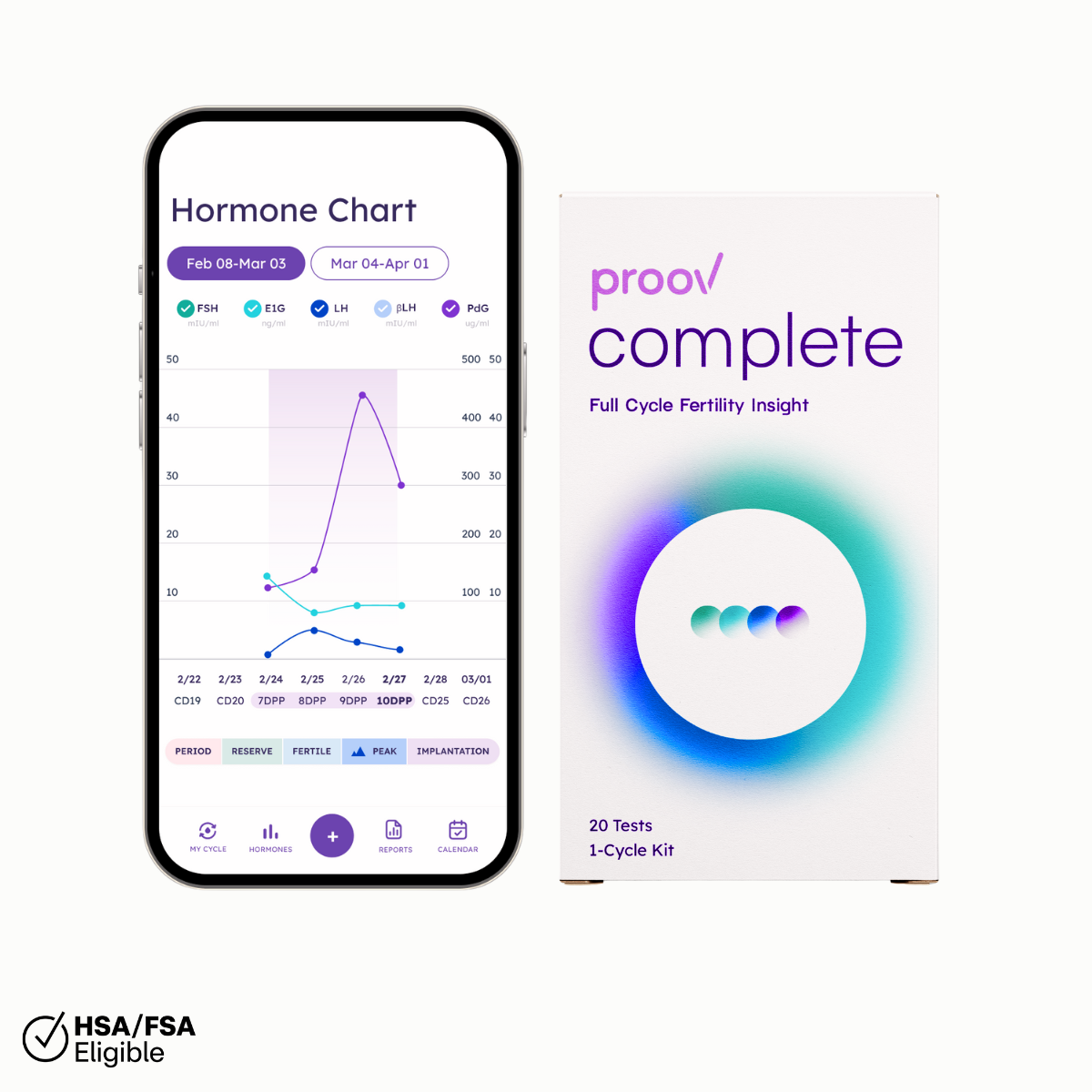Written by: Dr. Amy Beckley, PhD, Founder and Inventor of the Proov test — the first and only FDA-cleared test to confirm ovulation at home.
Written on 4/29/22
If your middle school health class was anything like ours, you may have learned that pregnancy can happen at literally any instant. And for some, that’s true!
But for others, trying to conceive may be more difficult than they originally thought. The good news is there are plenty of tools and tips to help you get pregnant — and we’ll be here every step of the way!
Keep reading to learn 5 reasons that may be why you can’t get pregnant.
#1: Timing intercourse correctly
In order for conception to occur, sperm and egg have to meet! Timing intercourse around when you’re most fertile (i.e. when intercourse is most likely to result in pregnancy) is step #1 on the journey to getting pregnant. After all, it takes two to tango!
If you’re not yet timing intercourse, you’re not alone — one study found that mistiming intercourse is actually the number one cause of infertility in most couples! Luckily, the fix is simple.
Something like an ovulation test is a great first step towards understanding when you’re fertile. These tests — like Proov Predict — measure the hormone that predicts when ovulation should occur, i.e. when that egg should be present to mingle with his sperm.
Using an ovulation test is pretty simple: once you get a positive result, it’s time to get busy!
As you continue to test over a few months, you may start to notice a pattern on which days you receive your positive test result. Once you start becoming more familiar with your cycle and ovulation patterns, we recommend starting to have intercourse a few days before you suspect to receive a positive ovulation test, as this can help maximize your chances at conception.
#2: You may not be ovulating.
Remember that handy ovulation test we just talked about? We think it’s poorly named, as this test does not actually confirm whether or not ovulation actually occurred. (We know, it’s downright confusing!)
Contrary to popular belief, ovulation tests can only predict when ovulation should occur — important information for timing intercourse around when you’re fertile, but not so helpful when it comes to confirming ovulation.
But why is confirming ovulation so important, you ask? Because without an egg, pregnancy can’t happen.
Not to worry, we’ve got something that can help! Proov Confirm is the first and only FDA cleared test to confirm ovulation from home.
Proov Confirm only turns positive after ovulation has occurred. If you never get a positive result, this could be a sign that ovulation is not happening, in which case we recommend following up with your doctor.
#3: Your body may not be conception ready.
Proov Confirm tests measure a different hormone from an ovulation test, something called PdG. This is a marker of the most-important post-ovulation hormone, progesterone.
Not only does PdG confirm ovulation (as we noted above), but it also is important for determining whether or not your body is ready for conception. Allow us to explain.
After ovulation occurs and sperm meets egg, they form an embryo. For pregnancy to occur, this embryo must attach itself in the uterus.
Progesterone is the hormone that makes the uterus “sticky” enough so that an embryo can comfortably implant and make its happy, healthy home. Not having enough progesterone (PdG) following ovulation can mean that your body may not be ready to receive that pregnancy.
Ensuring sufficient PdG levels during 4 key days (also known as the implantation window) ensures a newly formed embryo has a higher chance of thriving in your body. The good news is Proov Confirm can help you track your PdG levels over the implantation window, too!
Our patented PdG testing method allows you to confirm ovulation and understand if you’re conception ready during the implantation window.
#4: Something's up with your partner's sperm.
While women seem to bear a lot of responsibility when it comes to getting pregnant, let’s not forget about him! Male factor infertility — meaning issues with his sperm — accounts for over 50% of infertility cases, according to Yale Medicine.
Testing his swimmers at home is the easiest way to learn if there’s something preventing you two from conceiving. There are two important factors to consider when it comes to sperm: quantity and quality.
Quantity is pretty self explanatory: you’ll want to ensure that he has enough sperm in his semen. The less sperm present, the lower the chance of conception, according to the Mayo Clinic.
Sperm quality is the other half of the equation. Quality specifically refers to the sperm’s ability to get where it needs to go, meaning is it a good swimmer or not. If it can’t swim to the egg, then it has no way of fertilizing it!
Since both of these factors are equally important, we recommend an at-home sperm test that measures both, like the Yo Male Fertility Test. It’s done completely in the privacy of your home.

Proov and Yo fertility tests are done completely in the privacy of your home.
#5: Other fertility factors.
If you’ve tried all of the above, we recommend reaching out to your doctor for further evaluation. Doctors can run more extensive analyses compared to at-home tests, and can take your individual medical history into account.
If you’ve used Proov tests, you can always set up a consultation with one of our partner doctors who are experts in reading and interpreting Proov test results.
Have questions about what test is right for you or what to do next? Feel free to reach out to us!
















